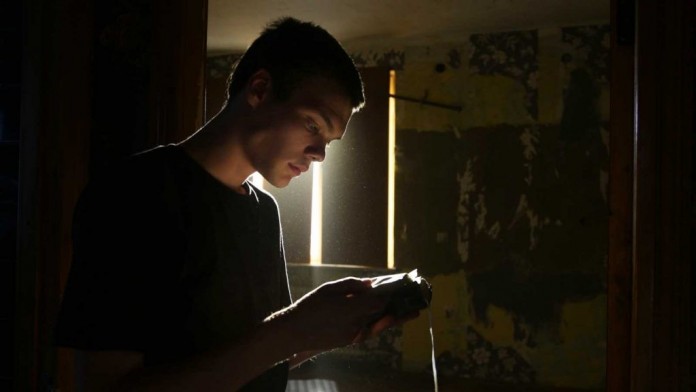Russian director Kirill Serebrennikov’s previous film, Betrayal (2012), was a romance about two people coming together after discovering their respective partners’ affair. The Student is a whole other affair, dealing with a teen’s crisis. Based on Marius von Mayenburg’s play Martyr (so brilliantly staged in London last year and adapted by Serebrennikov for the screen), this is not your usual hormonal angst, but a full-blown religious breakdown.
Veniamin (Petr Skvortsov) is the teen in question, living with his single mum (Julia Aug) in an apartment that looks like it was decorated by William Morris’s depressed alter ego. Floral patterns abound, on the walls, the carpets, the upholstery and even on mum’s clothes in a swirl of blossoms and vines that are not so much a blooming Garden of Eden as a Day of the Triffids nightmare. The tones are browns and murky greens, and it is fertile ground for madness. When we first meet mum and son, they seem like your regular awkward teen and embarrassing parent, but it soon becomes clear that Veniamin is nurturing a fecund religious awakening.
At the school swimming lesson he is appalled at his classmates’ shameless cavorting in bikinis and tiny trunks, hurling biblical quotes at them as they frolic. As the film proceeds, so Veniamin’s abhorrence at contemporary life and its rejection of biblical tenets grows. Nobody escapes his wrath: his mother risks eternal damnation for dating while the school priest is chastised for his love of luxury, but it is the school science teacher Elena (Victoria Isakova) who bears the brunt of Veniamin’s fundamentalist fervour, particularly during lessons concerning sex education and evolution.
This film peers at Russian society and quickly reveals its religious superstitions, ignorance and easy anti-Semitism. This is thanks to Elena’s colleagues, the headmistress quick to appease Veniamin and dismiss science. Soon the school kids are clad in sensible swimming attire while the headmistress and her cronies get drunk and genuflect before the cross Veniamin has erected in the school hall. Veniamin’s mum hasn’t got much time for religion and isn’t even sure if she was baptised, but the majority of characters seem to have shed their country’s more recent past and readily embraced its old Orthodox ways. The priest (Nikolai Roschin), with his bizarre rituals and gangster jewellery, is your classic depiction of religious hypocrisy. And this is what makes the film so interesting. For all Veniamin’s mad rantings, he is right when pointing out the decay of society and the superficiality of most religious practice. Grisha (Alexandr Gorchilin) is the school punching bag, a bullied “cripple” with a limp who is Veniamin’s eager disciple and the personification of people’s desperate need for faith and blind love.
As Veniamin, Skvortsov is terrifying and pathetic as we watch him struggle with his hormones and his faith, while Aug is great at the exasperated mother, providing some much-needed humour. The various teaching staff all put in solid performances, particularly Isakova who depicts Elena’s obsession growing almost as much as her pupil’s. Cinematographer Vladislav Opelyants creates a world seen through murky waters, with greenish tinges that bring to mind a dirty aquarium. Although Veniamin spouts too many bible quotes and too few of his own words, Serebrennikov entertainingly and intelligently outlines the boy’s terrifying descent into Christian fundamentalism in a country lacking any kind of moral code.









